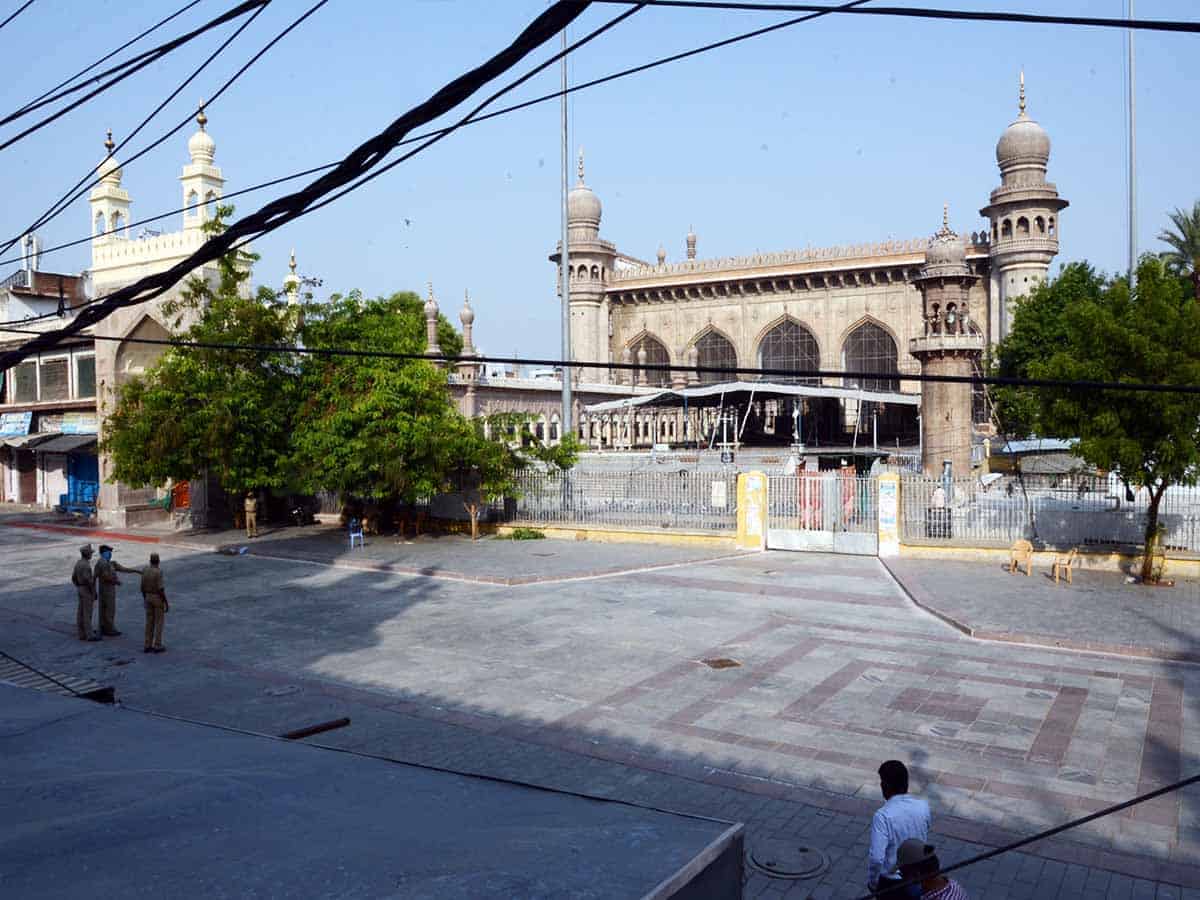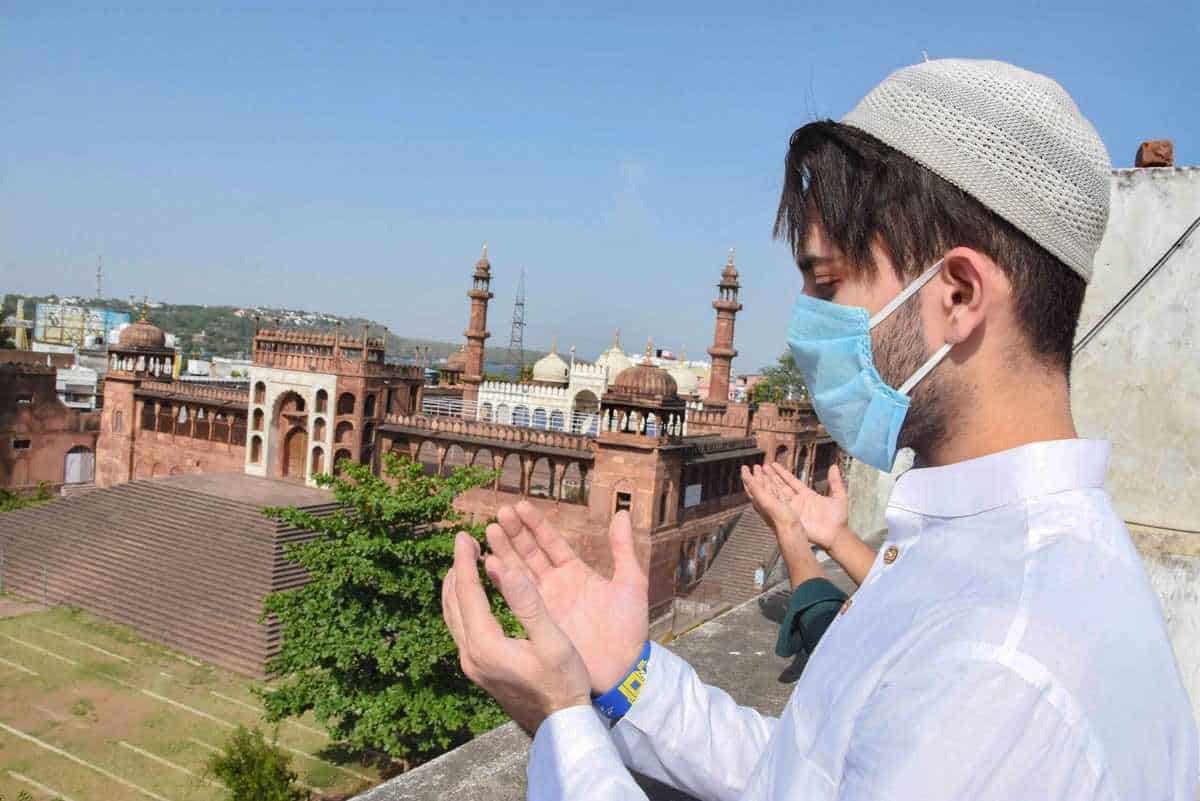New Delhi: Eid-ul-Fitr was celebrated in India on Monday in the shadow of the coronavirus pandemic with no traditional congregational prayers in mosques and idgahs or community gatherings due to the lockdown restrictions and the need to maintain social distancing.
Prime Minister Narendra Modi, Congress chief Sonia Gandhi, various chief ministers and other leaders extended greetings on the festival, hoping that the special occasion furthers the spirit of compassion and harmony.
The vast premises of the historic Jama Masjid and Fatehpuri Masjid in the national capital, where thousands offer the Eid namaz, looked desolate as only the Shahi Imams and mosque staff attended the traditional prayers.
The scenes were no different in other parts of the country as religious places remained closed due to the lockdown restrictions, reflecting how the coronavirus pandemic which has infected over 1.3 lakh people in India has upended the lives of the people.

At some places notices were pasted at the gates of mosques asking the people to offer prayers at home because of the pandemic.
Police personnel in large numbers were deployed around major mosques in many areas and traffic movement was restricted.

Prominent clerics and religious organisations had also appealed to people to adhere to social distancing and lockdown guidelines of the government and pray at home.
Online gatherings replaced family and community get-togethers on Eid as people prayed at home and avoided customary visits on the occasion, while many could not travel to join their families due to the coronavirus lockdown since March 25.

“People should serve those in need, including the ones affected by the disease. The virus can be defeated by people through precautions like social distancing,” the Shahi Imam of the Jama Masjid, Syed Ahmed Bukhari, said in his Eid message.

Forced to stay indoors due to the coronavirus threat, Shafique Alam, a school teacher and resident of Jamia Nagar, said, “I offered namaz at home along with my two brothers and our children.”

“But the Eid Namaz at a local mosque was immensely missed as it used to be an occasion to meet friends and neighbours, hug them and revive the bonds of togetherness,” he said.
The usual hustle and bustle associated with the festival was missing from the markets and other public places where people venture out to celebrate.
In riot-affected northeast Delhi, several families were still trying to get their lives back on track.
Furkan, along with four brothers, had been running a sweet shop in Old Mustafabad for nearly 20 years. Usually, they were so overburdened that they ended up doing six months’ work to meet the demands of customers during the holy month of Ramzan, he said.
He opened his shop for the first time after nearly three months on Eid with the hope of making some money.
“This year, due to the riots and then the lockdown, shops were closed and we have hardly earned anything in the last three months. How do we celebrate Eid when we hardly have money to purchase essentials?” he said.
The sight, smell and sounds of Eid were also missing from Zakaria street and other areas in Kolkata which don a festive look every year with numerous food stalls and gift shops.
State minister and Kolkata Municipal Corporation administrator Firhad Hakim offered namaz at his Chetla residence in south Kolkata along with wife and daughters.
“Our combined prayers to the Almighty to defeat coronavirus and end misery of people struck by cyclone Amphan,” Hakim told reporters.
Irfan, a rickshaw-puller in Phoolbagan area of Kamarhati, on the northern fringes of the West Bengal capital, said he and his family visited a neighbour and offered thanksgiving prayers together.
“This year, we could not visit Kamarhati Badi Masjid compound, as the imam had asked us to stay at home. My wife has prepared sevai for us on the occasion, and I can’t wait to taste it,” he said.
Chairman of Bengal Imams Association Mohammed Yahia said all 26,000 mosque committees in the state have asked the faithfuls to offer Eid namaz with their families at home.
“This ground had witnessed large crowds on Eid and Bakrid every year but the seriousness of the situation today has to be taken into account, a prominent Muslim cleric of Lucknow, Maulana Khalid Rashid Farangi Mahali, said after leading a prayer by a handful of people, who wore masks and maintained social distancing, at the Idgah.
The celebrations were subdued in Hyderabad and other places in Telangana as well, in contrast to the festivities witnessed every year, especially in the old city.
SK Muddin, national convenor of the RSS-affiliated Muslim Rasthriya Manch, said Muslims followed the lockdown norms strictly.
“The Muslim community which has clung to virtues like patience since the beginning of Ramzan (the holy month of fasting that culminates with EID) maintained and manifested it today,” he said.
In Jaipur, woman police personnel offered chocolates and gifts to children in the walled city area where public movement is restricted.
Though lockdown restrictions, imposed to curb the coronavirus spread, had been eased outside COVID-19 hotspots after May 17, people mostly stayed indoors.
In Rajkot, Gujarat, police officials staged a march in some Muslim-dominated areas and urged people to maintain social distancing while celebrating Eid.
In Ahmedabad, the worst coronavirus-hit district in Gujarat, the festival passed off peacefully, according to the police.
“The Muslim community in Ahmedabad followed our instructions and remained indoors while celebrating Eid today. There was no gathering for namaz in open areas or in mosques.
“There was not a single incident of any unrest. The festival was celebrated peacefully and by following social distancing norms,” said Deputy Commissioner of Police, Control, Vijay Patel.
Guwahati-based entrepreneur Atiqur Rahman Barbhuiya said his family did not go for shopping and distributed money to the poor people, who are suffering most in this lockdown period.
He termed this year’s Eid amid the lockdown as a “blessing in disguise” as women, who usually do not perform namaz at mosques, were able to offer the special prayers with other male family members at home.
“I offered my Eid namaz with my daughter and son at home,” he said.
Maulana Maqsood Imran, the Khateeb-O-Imam, Jama Masjid, Bengaluru, said: “Coronavirus is spreading very rapidly in our country. If we don’t follow the guidelines, it will not only cause trouble to us but also to the doctors and the government. It will be the biggest celebration if we abide by the norms.”
Eid, which marks the end of the fasting month of Ramzan, was celebrated on Sunday in Kerala and Jammu and Kashmir.

